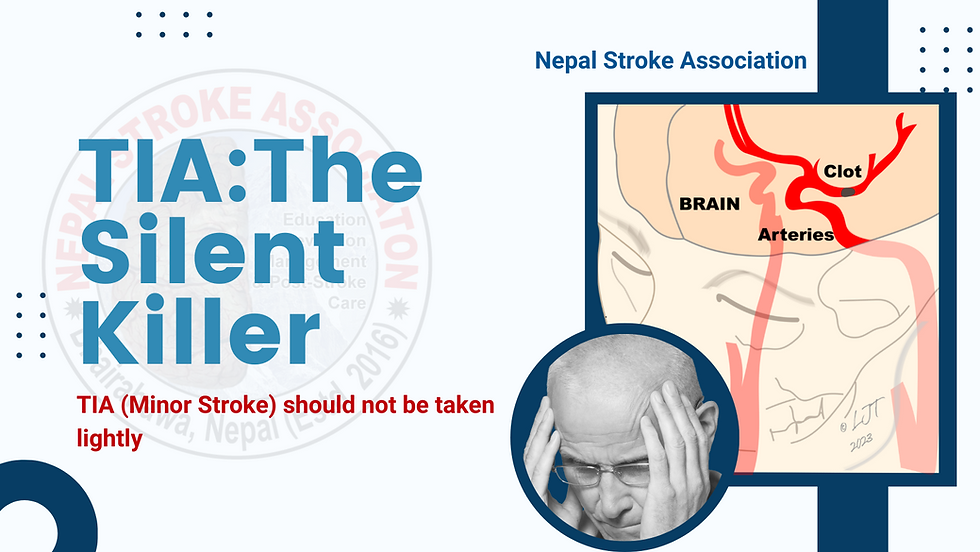TIPS TO PREVENT STROKE (BRAIN ATTACK) IN WINTER SEASON
- neuroclinician
- Jan 15, 2023
- 3 min read

Stroke is a medical emergency. Time is an essence of stroke treatment and a patient should reach to a nearby hospital at the earliest preferably within three hours of stroke symptoms onset.
There are many risk factors for stroke. Hypertension, Smoking, Hyperlipidemia, Diabetes, Atrial fibrillation (irregular heart beat) are few common risk factors. We had studied the prevalence and risk factors associated with stroke in our community. The details can be found in this link: https://doi.org/10.1016/j.jstrokecerebrovasdis.2021.105716
Winter season is also frequently attributed not only as a cause of increased incidence of stroke but also increased morbidity and mortality. (T.S. Ng et al. 2016, G. Sacco et al. 2000, J. Roine et al. 2005) This is because a greater number of stroke patients are observed to be admitted during this season. Although many research studies that have investigated the relationship between the winter season and stroke incidence, the exact cause is still unknown.
There are a number of factors that contribute to the increased incidence of stroke during the winter season. Some of the main reasons include:
Cold temperatures: Cold temperatures can cause blood vessels to constrict, which can lead to a decrease in blood flow and chances of clot formation in the brain vessels.
Reduced physical activity: Cold temperatures and shorter days can make it more difficult for individuals to be physically active, which can increase the risk of stroke due to a lack of exercise.
Increased stress: The holiday season and the added stress that comes with it, can also increase the risk of stroke. Stress causes the release of certain hormones that can cause blood vessels to constrict, which can increase the risk of stroke.
Exacerbation of underlying conditions: The colder temperatures and increased stress of the winter season can make it more difficult for individuals to manage underlying conditions such as hypertension and high cholesterol, which can increase the risk of stroke.
Increased respiratory infections: Winter months tend to have more respiratory infections which can lead to inflammation and increase the risk of stroke.
Vitamin D deficiency: The winter season can also cause a deficiency in vitamin D, which is important for maintaining healthy blood vessels and reducing the risk of stroke.
It is important for individuals to be aware of these risk factors and take steps to protect themselves during the winter season.
Here are some steps you can take to help prevent stroke during the winter season:
Stay active: Regular physical activity can help improve circulation and reduce the risk of blood clots. Even if it's cold outside, try to get at least 30 minutes of moderate physical activity most days of the week.
Manage your blood pressure: High blood pressure is a major risk factor for stroke. Make sure to monitor your blood pressure regularly, and if it's high, work with your doctor to manage it.
Eat a healthy diet: Eating a diet that is high in fruits, vegetables, and whole grains, and low in saturated and trans fats, can help to lower your risk of stroke.
Don't smoke: Smoking increases your risk of stroke. If you smoke, now is the perfect time to quit.
Keep warm: Keep your home warm, and make sure you're dressed warmly when you go outside. Cold temperatures can cause blood vessels to constrict, which can increase your risk of stroke.
Be aware of your surroundings: Be extra cautious in the winter, as it can be more slippery outside. Take precautions to avoid falls, which can cause injuries that increase the risk of stroke.
Manage underlying conditions: If you have underlying health conditions such as hypertension or high cholesterol, it is important to manage them properly. Make sure to keep in touch with your doctor to stay on top of your health.
Vitamin D supplement: With less sunlight during winter, its important to consider taking a Vitamin D supplement to maintain healthy levels of this important vitamin that aids in maintaining healthy blood vessels and reducing the risk of stroke.
It is important to note that stroke can happen to anyone at any time, so it is important to take steps to reduce your risk all year round. These tips can help you to reduce your risk of stroke during the winter season, but you should always work with your doctor to develop a personalized stroke prevention plan that is right for you.
Do you agree that there are high chances of having stroke (Brain attack) in winter season?
Yes
No
I am not sure



Comments